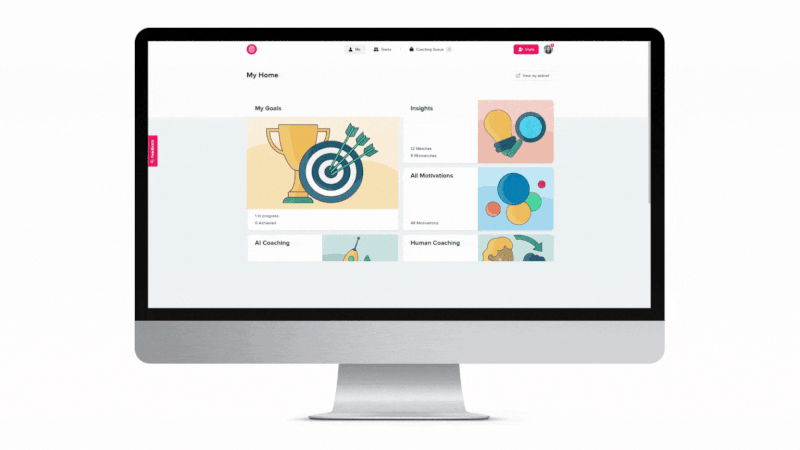What is a life coach? And how to know if it’s right for you
For better or worse, we’ve been taught to think about work in specific ways, usually involving productivity and innovation, and often rooted in metrics. These are what we’ve come to call “hard” concepts, i.e. they can be easily tracked and documented: earnings, revenue, growth, calls made, campaigns sent, products launched, etc.
- Author
Ted Bauer

Then there’s an additional bucket of work that’s more “soft” concepts, i.e. compassion, empathy, active listening, effective communication, and the like. Those concepts are probably more important to effective work, but it’s much harder to track whether someone is an active listener vs. whether someone closed $1,000,000 worth of business in a given time frame.
When we consider what is life coaching in the context of hard work concepts, we often think about consulting. A consultant, or a firm, comes in and analyzes data, market position, branding, sales channels, customer experience approaches, and more. They make quantified, data-driven recommendations to their client. Numbers and analytics rule the day.
But when we think about “coaching” along the soft skill continuum, we think of something different. These are more discussions and evaluations, personal growth understanding, and soul-seeking. We think of people like Brene Brown, Oprah Winfrey, and Tony Robbins. These are coaches who care about the numbers, of course, but they care more about the person and the soul and purpose they’re trying to fill, professionally and personally.
Into this soft skill coaching bucket falls the idea of a “life coach.” The idea can seem a little fluffy to hardcore business professionals, sure. It can even seem diminutive -- if you have a life coach, does that mean you’ve done something wrong in your life that needs coaching or correcting? Not necessarily.
It’s worth exploring the core question: What is life coaching? Let’s give it a shot.
What is a life coach?
A life coach is someone who provides a non-therapeutic, non-medical way to navigate the ups and downs of career, relationships, health, and finding purpose.
Per VeryWell Mind, a life coach is:
“... a type of wellness professional who helps people make progress in their lives in order to attain greater fulfillment. Life coaches aid their clients in improving their relationships, careers, and day-to-day lives.”
What's the difference between a life coach and a therapist?
Therapists have degrees as licensed mental health professionals; some therapists are even medical doctors and can prescribe antidepressants and the like. As such, they are beholden to a board, follow an ethical code, need to keep up with continuing education, and are regulated around confidentiality.
Life coaches are not governed by a board and don’t have to keep up with any regulatory environment. Life coaches generally do not treat mood disorders, anxiety disorders, addiction, or other mental health conditions. As a result, a life coach is not an effective substitute for a mental health professional.
Rather, a life coach is more likely to work with you on:
- Broader personal and professional goals
- How to set up each day to move towards those goals
- A better work-life balance
- How to be a good manager of others
- Enhanced creativity
- More financial security
- Improved communication skills
- Better personal relationships
- How to combat feeling overwhelmed
- Better relationships with those on your work team
For many life coach clients, the simple answer to “What is life coaching?” is accountability, in that it’s a person who helps you bridge the gap between the life you currently have and the professional-personal life interplay that you want.
Can a life coach help with burnout?
With more than 75% of employees having felt burned out at work, a dedicated coach can help you restore your work-life balance and wellbeing.
The problem is that within organizations, there often aren’t people you can talk to about these topics. HR isn’t normally equipped to help, and executives often see signs of burnout as meaning you’re dedicated to your job and deserving of more. So where can you turn if everything feels overwhelming and you’re burning the proverbial candle at both ends?
That’s a good pocket for a life coach, who can help you focus on:
- Priorities
- Who matters
- How to make more time for them
- Workarounds for work pressures
- Focus
- Seeking purpose
- Importance of health, exercise, and general wellness
- Etc.
You could also go to a therapist for burnout, but the approaches would be somewhat different. The life coach would be focused on actionable plans, i.e. working through solutions and immediate action items you can pursue. The therapist would do that, but it would be more talk- and insight-oriented about the feelings and experiences that brought you to the moment of burnout.
What are the types of life coaches?
Many do take an all-encompassing approach to life coaching, but there are specific niches in the coaching industry, which tend to include:
- Career coaching
- Relationship coaching
- Financial coaching
- Health coaching
- Executive coaching
- Sports performance coaching
- Spirituality coaching
Based on their focus or niche, a life coach will take a specific approach to problems and working with you -- which is largely why this is such a referral-driven industry because people need to know that the style of the coach will work with them.
A lot of life coaches will meet with a potential client several times free of charge to begin to develop the relationship, but this varies by coach.
Is there evidence that life coaching works well?
This is where we try to bridge the “hard coaching” -- numbers-focused -- with the “soft coaching” -- personality and purpose-focused.
There is, in fact, some evidence that coaching works well.
One study out of Austria showed that life coaching, in both individual and group formats, can be helpful in reducing procrastination and increasing goal attainment.
A 2013 study titled “Can life coaching improve health outcomes?” found that, yes, it can -- it helps improve self-efficacy and self-empowerment.
A controlled trial study out of Spain this year showed that life coaches enhance well-being and improve the overall functioning of organizations.
A 2016 integrative review of life coaching outcomes on PsycNet did show that it largely works, although outcomes obviously vary by individual.
Michelle Duval (Founder of Fingerprint for Success) conducted a 20-year qualitative and quantitative study on the results of coaching individuals based on their motivational work traits, and was able to identify 48 unique traits that have clear implications for venture success and high performing teams and their leaders.
How much does a life coach cost?
The cost of a life coach will depend on their experience and coaching niche. Typically, you can expect to pay $500 to $5000 USD per month for traditional business coaching services.
At F4S we're on a mission to make coaching and self-development accessible. We've developed AI Coach Marlee to provide an online coaching experience. Best of all, our starter plan is free and includes access to one of our many professional and personal development programs. And we have additional membership plans and human coaches if that's your preference.
To get started, take our free assessment. You'll gain instant access to your results in your dashboard.

F4S dashboard
Then set a goal and Coach Marlee will recommend the best coaching programs based on your goal.
A common misconception: life coaching is only for those who are struggling
As Tony Robbins, one of the pioneers in the life coaching field, has noted: coaching is for anyone who wants to improve their performance, even if that performance is already objectively very high. This is often framed up in an athlete analogy. By the time an athlete becomes a professional in his/her sport, they are already elite. Less than .0001% of athletes will reach that level. Does that mean they simply stop because they’ve scaled the mountain to that point? No.
For example, LeBron James is definitely one of the greatest basketball players of all time, and potentially the greatest. He recently won his fourth NBA Championship. Yet as he explains in this interview with Tim Ferriss, he still employs coaches and works on effective routines, effective diet, the most-optimized icing schedule for his muscles, and more.
So can already-conventionally-successful people work with life coaches and see benefits? Absolutely.
Insight from coaching professionals
Sometimes it’s helpful to look at some of the biggest names in the field and see what they discuss and what realizations they open up for others.
For life coaching, Brene Brown is a big example. Her power of vulnerability TED Talk initially put her on the scene, but now she has huge speaking fees, popular books, a top podcast, and has even been profiled by 60 Minutes.
She helps clients (and non-clients too!) with issues around empathy, shame, compassion, mental health, and healing. One of her notable, but less-publicized, observations is about “the second act of life.”
Last year, Brown gave a talk at Pixar Animation Studios, where president Ed Catmull (who helped save Pixar with Toy Story) and his team explained that the middle of the creative process is the hardest part. In the script, for example, it’s where the main character must face a tough journey to learn a lesson. That shaped her theory: You can’t skip the second act. “People don’t recount the middle of the story often,” Brown says. “[It has] the most potential for shame. But it’s where everything important happens.”
That’s a powerful example of how a life coach can frame things for you. Many of us view “the second act” of life as a slog of work, relationships, children, and dealing with messy topics like death and mortgages. But as she notes, it’s where everything important happens. A life coach can help you see this reality, and help you understand that you need to take time to appreciate and savor what’s happening around you.
Tony Robbins has good executive life coaching advice: “Every business has a business it currently is, and a business it’s becoming.” In the context of disruption, what could be more true?
Can a professional coach help you create your ideal life?
That depends on you. If you're ready to optimize some element of your life and make a commitment to taking action, life coaching services might just be the answer.


